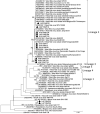Survey of West Nile and Banzi Viruses in Mosquitoes, South Africa, 2011-2018
- PMID: 36573591
- PMCID: PMC9796198
- DOI: 10.3201/eid2901.220036
Survey of West Nile and Banzi Viruses in Mosquitoes, South Africa, 2011-2018
Abstract
We collected >40,000 mosquitoes from 5 provinces in South Africa during 2011-2018 and screened for zoonotic flaviviruses. We detected West Nile virus in mosquitoes from conservation and periurban sites and potential new mosquito vectors; Banzi virus was rare. Our results suggest flavivirus transmission risks are increasing in South Africa.
Keywords: Banzi virus; Culex; Culicidae; South Africa; West Nile virus; disease vectors; flavivirus; vector-borne infections; viruses; zoonoses.
Figures


References
Publication types
MeSH terms
Grants and funding
LinkOut - more resources
Full Text Sources
Medical

